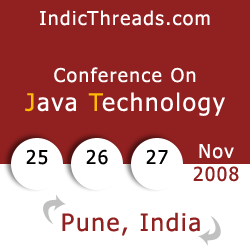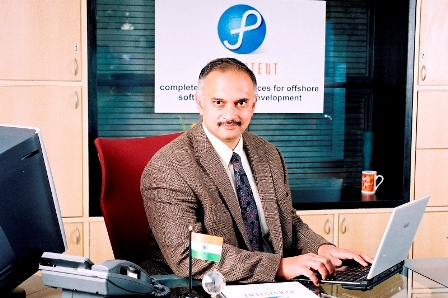Note: Most of the presentations are online at the conference homepage.
 The IndicThreads conference on Java technologies, which is an annual occurrence in Pune happened over the course of 3 days last week, and IndicThreads were gracious enough to invite me to attend the conference (sort of a press pass, so to speak), and although I wasn’t able to attend the whole conference, I did manage to squeeze in a couple of hours each day, and was very glad that I did, because I ended up with some really enriching sessions.
The IndicThreads conference on Java technologies, which is an annual occurrence in Pune happened over the course of 3 days last week, and IndicThreads were gracious enough to invite me to attend the conference (sort of a press pass, so to speak), and although I wasn’t able to attend the whole conference, I did manage to squeeze in a couple of hours each day, and was very glad that I did, because I ended up with some really enriching sessions.
On the first day of the conference, the two big names of the tech industry in Pune, Ganesh Natarajan and Anand Deshpande gave keynote addresses. Ganesh, who is CEO of Zensar, and President of NASSCOM gave the NASSCOM view of the coming recession. His main thrust was that the Indian software / BPO industry will not be as badly affected by the recession as the rest of the world. He had a large number of graphs and figures to make the following points:
- We had already been tightening the belt for almost an year now, so we are in much better shape to handle the recession than those who weren’t being so prudent
- We are creating new products, tackling new verticals, and focusing on end-to-end service (and these claims were all backed by facts and figures), and this diversification and added value makes us resilient
And he spent a lot of time pointing out that to do even better, or primary focus needs to be the tier 2 / tier 3 cities, 43 of which have been identified by NASSCOM and whose developement will get some attention. Also, our tier 2 / tier 3 colleges are sub-par and a lot of work is needed to improve the quality of students graduating from there. NASSCOM has started a number of initiatives to tackle this problem.
Since this was a conference for Java techies, Anand Desphande, CEO of Persistent, presented his view of the broader context in which the Java programmers exist, and what are the things they need to think about (other than their code) to have a better long term view. Basically:
- Multicore chips, and why programmers need to worry about them
- Mobile Telephony: the desktop/laptop is no longer the primary target device for programmers. Think about the mobile users, and how what they want is different from the traditional PC users
- Cloud and SaaS: is coming in a big way, and will change the way people use software. Also, it makes life easier for users, but much more difficult for programmers. So need to improve skills in these areas
- Web 2.0 and Social Networking: these are exciting new fields with a lot of growth. They require a different kind of programming mindset.
- Rich Internet Applications: Similar to above
- Large Volumes of Diverse Data (including BI and analytics)
- Open source is on the rise. As programmers, you must have a good understanding of various open source licenses
- Gaming and Entertainment boom: Too many programmers think of only corporate world & green monitors etc. Think different. E.g. Gaming and entertainment are large markets and require a different mindset to come up with new ideas in these fields.
- Green IT: Instead of worrying about speed and efficiency, for the first time, worrying about power consumption has started affecting programmers
- Be a part of the community. Give back. Do open source. Join CSI ACM. IEEE. (and I would like to add contribute to PuneTech)
Anand also predicted that in the next 6 months, the Industry will see serious job cuts and salary cuts, and he things it is unavoidable. But pointed out that those who take trouble to keep themselves updated in their area of expertise, and go deep (instead of just doing “enough”) will not have a problem, and in fact will be best positioned to take advantage of the situation when the financial situation starts recovering after 6 to 9 months.
I missed the rest of day 1, but it has been covered in great detail by Dhananjay Nene. on his blog, as well as Varun Arora on the IndicThreads blog (part 1, part 2).
The highlight of day 2, and in fact the highlight of the whole week for me, was the presentation by DJ Patil, Chief Scientist of Linked-in. DJ Patil is in charge of all the data analysis that happens at Linked-in – basically the advanced guess they make like: “people who viewed this profile also viewed these other profiles”, and “people whom you might know” etc. He was not listed on the conference schedule – and was just passing through, and got invited to talk. He gave a great talk on an overview of how linked in works, their strategy for linked-in apps (the third-party apps that are integrated into the linked-in website). Again Dhananjay has already captured most of DJ’s important points on his blog, so I will not repeat those here. But I did have a very detailed conversation with DJ afterwards, and one of the things that came through was that they are looking seriously at India and wondering what they can / should do to get more Indians on linked-in. India already has about 4.8% of linked-in’s users. He was very open about trying to find out what are the things about linked-in that we don’t like, what are the things in linked-in that we would like to change, and what are the features we would like to see. If you have suggestions, send them over to him – he is dpatil on twitter.
The third day had a session on Grails by Harshad Oak, and if you are not familiar with Rails, or any of the other “programming by convention” schools of software, it is definitely something you should check out. It can reduce development times by orders of magnitude on things like building web applications and other things that are done over and over by programmers all over the world.
For other talks that happened, but which I missed, unfortunately, I haven’t been able to find any reports or blog posts giving details, but you can see the conference schedule to get an idea of what went on.

![Reblog this post [with Zemanta]](http://img.zemanta.com/reblog_b.png?x-id=9dbf2fc2-9e78-40e0-a3ef-ff26756de443)
 What:
What: ![Reblog this post [with Zemanta]](http://img.zemanta.com/reblog_b.png?x-id=cc35922e-1eaf-4ec5-8337-b9c176b4803b)

![Reblog this post [with Zemanta]](http://img.zemanta.com/reblog_b.png?x-id=22125db3-9932-4af5-a5b9-a533e76c1ee9)
![Reblog this post [with Zemanta]](http://img.zemanta.com/reblog_b.png?x-id=e6dbe910-39b7-4bb2-b99a-adafe2acd6ba)
![Reblog this post [with Zemanta]](http://img.zemanta.com/reblog_b.png?x-id=f1449fa2-bb99-4505-a215-ebe3b6dd8b09)
 Anand Deshpande, CEO of Persistent,
Anand Deshpande, CEO of Persistent, 